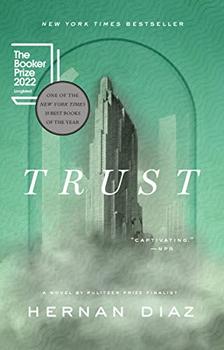Summary | Excerpt | Reading Guide | Reviews | Beyond the Book | Readalikes | Genres & Themes | Author Bio

ONE
Because he had enjoyed almost every advantage since birth, one of the few privileges denied to Benjamin Rask was that of a heroic rise: his was not a story of resilience and perseverance or the tale of an unbreakable will forging a golden destiny for itself out of little more than dross. According to the back of the Rask family Bible, in 1662 his father's ancestors had migrated from Copenhagen to Glasgow, where they started trading in tobacco from the Colonies. Over the next century, their business prospered and expanded to the extent that part of the family moved to America so they could better oversee their suppliers and control every aspect of production. Three generations later, Benjamin's father, Solomon, bought out all his relatives and outside investors. Under his sole direction, the company kept flourishing, and it did not take him long to become one of the most prominent tobacco traders on the Eastern Seaboard. It may have been true that his inventory was sourced from the finest providers on the continent, but more than in the quality of his merchandise, the key to Solomon's success lay in his ability to exploit an obvious fact: there was, of course, an epicurean side to tobacco, but most men smoked so that they could talk to other men. Solomon Rask was, therefore, a purveyor not only of the finest cigars, cigarillos, and pipe blends but also (and mostly) of excellent conversation and political connections. He rose to the pinnacle of his business and secured his place there thanks to his gregariousness and the friendships cultivated in the smoking room, where he was often seen sharing one of his figurados with some of his most distinguished customers, among whom he counted Grover Cleveland, William Zachary Irving, and John Pierpont Morgan.
At the height of his success, Solomon had a townhouse built on West 17th Street, which was finished just in time for Benjamin's birth. Yet Solomon was seldom to be seen at the New York family residence. His work took him from one plantation to another, and he was always supervising rolling rooms or visiting business associates in Virginia, North Carolina, and the Caribbean. He even owned a small hacienda in Cuba, where he passed the greater part of each winter. Rumors concerning his life on the island established his reputation as an adventurer with a taste for the exotic, which was an asset in his line of business.
Mrs. Wilhelmina Rask never set foot on her husband's Cuban estate. She, too, was absent from New York for long stretches, leaving as soon as Solomon returned and staying at her friends' summerhouses on the east bank of the Hudson or their cottages in Newport for entire seasons. The only visible thing she shared with Solomon was a passion for cigars, which she smoked compulsively. This being a very uncommon source of pleasure for a lady, she would only indulge in private, in the company of her girl-friends. But this was no impediment, since she was surrounded by them at all times. Willie, as those in her set called her, was part of a tightly knit group of women who seemed to constitute a sort of nomadic tribe. They were not only from New York but also from Washington, Philadelphia, Providence, Boston, and even as far as Chicago. They moved as a pack, visiting one another's houses and vacation homes according to the seasons-West 17th Street became the coterie's abode for a few months, starting in late September, when Solomon left for his hacienda. Still, no matter in what part of the country the ladies happened to dwell, the clique invariably kept to itself in an impenetrable circle.
Limited, for the most part, to his and his nursemaids' rooms, Benjamin had only a vague notion of the rest of the brownstone where he grew up. When his mother and her friends were there, he was kept away from the rooms where they smoked, played cards, and drank Sauternes well into the night; when they were gone, the main floors became a dim succession of shuttered windows, covered furniture, and chandeliers in ballooning shrouds. All of his nurses and governesses said he was a model child, and all of his tutors confirmed it. Manners, intelligence, and obedience had never been combined as harmoniously as in this sweet-tempered child. The only fault some of his caregivers could find after much searching was Benjamin's reluctance to associate with other children. When one of his tutors attributed his student's friendlessness to fear, Solomon waved his concerns away, saying the boy was just becoming a man of his own.
Excerpted from Trust by Hernan Diaz. Copyright © 2022 by Hernan Diaz. All rights reserved. No part of this excerpt may be reproduced or reprinted without permission in writing from the publisher.
Your guide toexceptional books
BookBrowse seeks out and recommends the best in contemporary fiction and nonfiction—books that not only engage and entertain but also deepen our understanding of ourselves and the world around us.